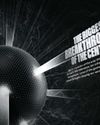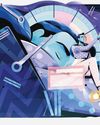
New figures suggest the number of sick leave days taken by UK workers is at its highest level in 15 years. Does this mean we're in poorer health and, if so, what's keeping us away from the workplace? A couple of years ago, COVID would have been the obvious culprit, but is it still to blame? And what can we do to keep people working? Well, the devil's in the data - if you know where to look...
ARE WE REALLY TAKING MORE SICK DAYS?
The worrying new numbers originate from the Chartered Institute of Personnel and Development (CIPD), an independent, non-profit, human resources organisation that has been reporting on sickness at work for more than 23 years.
Figures from its latest report were collected from the human resources departments of 918 organisations and cover a total of 6.5 million UK workers. They show that the average employee took just under eight days of sick leave in the past year - two more than in the pre-pandemic year 2019 and more than in any year since 2008.
The Office for National Statistics (ONS), however, puts the average number of sick days at closer to six, drawing from telephone surveys of 100,000 people. But the ONS data also shows a sharp rise in sick leave compared to pre-pandemic years.
This story is from the November 2023 edition of BBC Science Focus.
Start your 7-day Magzter GOLD free trial to access thousands of curated premium stories, and 9,000+ magazines and newspapers.
Already a subscriber ? Sign In
This story is from the November 2023 edition of BBC Science Focus.
Start your 7-day Magzter GOLD free trial to access thousands of curated premium stories, and 9,000+ magazines and newspapers.
Already a subscriber? Sign In

THE WORST IDEAS OF THE 21ST CENTURY
NOT ALL IDEAS CAN BE HITS. ALONGSIDE GROUND-BREAKING INNOVATIONS, 21ST-CENTURY SCIENTISTS HAVE HELMED THEIR SHARE OF WILD TECH FLOPS, DUBIOUS THEORIES AND OVERHYPED BREAKTHROUGHS. HERE ARE THE BIGGEST TO FORGET

10 IDEAS THAT WILL SHAPE YOUR NEXT 25 YEARS
Predicting the future is considered a fool's game. But it's one many of us like to play.

THE BIGGEST BREAKTHROUGHS OF THE CENTURY
We're a quarter of the way into the new century. To mark this milestone, we asked the UK's top minds to highlight some of the game-changing scientific breakthroughs shaping our world since the year 2000

DO THE SCIENCE COGNITIVE SHUFFLE
Trouble sleeping? A lot on your mind? Use this trick and sedate your synapses

WHAT DETERMINES HOW MANY ABS I CAN GET?
Assuming you're a human being, you have exactly the same number of abs as everybody else: two.

HOW CAN I IDENTIFY MY PSYCHOLOGICAL BLIND SPOT?
In the 1950s two American psychologists, Joseph Luft and Harrington Ingham, proposed a way of thinking about psychological blind spots - things you don't know about yourself - that they called the 'Johari Window' (the term is a combination of their first names).

How can I change my personality?
Want to become more confident, extroverted or assertive? Science shows that with a few simple changes, you can unlock your best self

Could your cosmetics be harming your health?
Cosmetic companies are phasing out microplastics and so-called 'forever chemicals' to help protect consumers.

extraterrestrial US Congress is talking about activity again. Is the truth really out there?
Despite several testimonies, the question remains frustratingly unanswered

Map of 100 million human body cells revealed
Over three dozen new studies mark significant milestone towards complete Human Cell Atlas